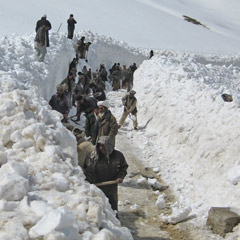D&P partner finds immediate rewards in Afghanistan development work
By Deborah Gyapong, Canadian Catholic News OTTAWA - Scott Braunschweig sometimes wonders if the development work he is doing in Afghanistan is “in some ways very selfish.” After all, he finds it so personally gratifying.
OTTAWA - Scott Braunschweig sometimes wonders if the development work he is doing in Afghanistan is “in some ways very selfish.” After all, he finds it so personally gratifying.Braunschweig works with Catholic Relief Services (CRS), the international development arm of the American bishops. He had worked in many other countries in overseas development previously, but often found it difficult dealing with bureaucracy to get things done. But in Afghanistan, “you get this immediate reward... you can see the physical health of the people improve when you put in a water project.”
Afghanistan had been on Braunschweig’s “no-go” list back in 2004 when he was looking at going overseas again. But despite his concerns about violence and negative perceptions about conflict, an intriguing position with the Tribal Liaison Office lured him there.
The country was “very poor, very undeveloped, with little infrastructure, and terrible roads, facing basic problems such as the lack of clean water and very few schools or educational outreach,” he said. “But you had people that were excited about the new opportunities that they foresaw at that time.”
A three-month contract extended into a year and a half. He then moved on to CARE, and in 2008 joined CRS, a Caritas partner of the Canadian Catholic Organization for Development and Peace (D&P).
Braunschweig was in Canada March 7 and 8, meeting at D&P headquarters in Montreal, then in Ottawa for meetings at CIDA, accompanied by D&P’s Afghanistan and Middle East Program Officer Sonia Lebesque.
Though he praised CIDA’s funding of a number of good projects in the country through a variety of NGOs, including D&P, CARE and the Aga Khan Foundation, Braunschweig said governments are not necessarily focused on development opportunities, but on trying to stabilize and pacify the insecure areas.
“The carrot/stick approach hasn’t resulted in sustainable development,” he said. “Our push is always to talk about doing development and doing it for its own sake.”
Afghans are very sensitive to any attempts to westernize, so CRS approaches the communities with great sensitivity to encourage involvement and support for projects.
“We’re very transparent about who we are; all our staff know about our principles,” Braunschweig said.
“You have to be respectful. It’s all about community mobilization and it can just take off.”
CRS, like other Caritas organizations, is “completely a service-oriented organization,” he said. There is no effort at conversion.
CRS has four main program areas in Afghanistan: community-based education; agriculture and agri-enterprise; water supply and watershed and soil conservation projects; and a humanitarian response capacity.
The humanitarian capacity has been helpful many times, like in 2008, when Afghanistan experienced the worst winter storms and most severe cold in a generation.
“CRS was able to clear roads, opening up markets and help people out so they could survive the winter and maintain their assets and their livelihood,” he said.
During the 2008 food crisis that saw the cost of basics quadruple, CRS helped by providing cash-for-work projects that would leave something tangible behind. Usually communities would decide to build or improve a road.
Working with women is a challenge. They usually have other community projects on the go before a women’s self-help group is formed.
One women’s group had trouble figuring out an income-generating project, so it was suggested they start a bakery. This involved literacy and business training, the buying of ovens and ingredients for the dough, he said.
Within two weeks, the bakery had a major contract from the local police department and contracts from local stores and became self-sustaining.
Lebesque pointed out CRS is not D&P’s only partner in Afghanistan. The Canadian bishops’ development agency has managed a total of $5 million worth of projects in Afghanistan and Pakistan since 2001.
D&P has been supporting projects empowering women and women’s groups, promoting alternative development models created by local social movements, democratization and citizen participation, strengthening grassroots organizations and conflict resolution and peace-building.
Please support The Catholic Register
Unlike many media companies, The Catholic Register has never charged readers for access to the news and information on our website. We want to keep our award-winning journalism as widely available as possible. But we need your help.
For more than 125 years, The Register has been a trusted source of faith-based journalism. By making even a small donation you help ensure our future as an important voice in the Catholic Church. If you support the mission of Catholic journalism, please donate today. Thank you.
DONATE
